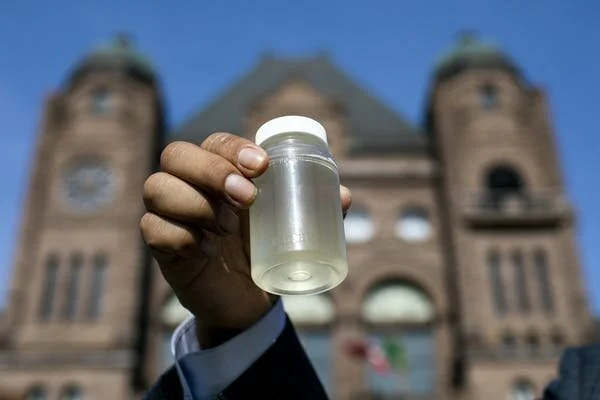Luis Ramirez leapt onto the roof of his bright blue water truck to fill the plastic tank that by day’s end would empty into an assortment of buckets, barrels and cisterns in 100 homes. It was barely 11 a.m. and Ramirez had many more stops to make on the hilly, grey fringes of Tijuana, a sprawling, industrial border city in northwestern Mexico where trucks or “pipas” like Ramirez’s provide the only drinking water for many people.
Water testing to be free for flood-impacted Manitobans, province announces
Flood-impacted Manitobans with private wells and cisterns can test their water supply for free, as the province pushes to waive off fees temporarily. The move will subsidize costs related to water testing. In an announcement on May 8, the province said the push aims to lift some of the financial burdens caused by flooding. It comes into effect Monday and ends on Aug. 31.
Kingston council to take a second look at bulk water rate increases
The city is to take another look at portions of Utilities Kingston’s 2023 budget. Councillors unanimously approved a motion to defer implementation of a new set of rates. Contained within those rates were increases to bulk water charges and wastewater disposal charges that would translate to big price hikes for some Utilities Kingston customers, particularly in rural areas of the city.
Non-profit in Salt Spring Island, B.C. offers rebate to homeowners collecting rainwater
A non-profit organization in Salt Spring Island, B.C., dedicated to fighting climate change is encouraging residents to take advantage of the rain this fall by installing a rainwater collection system. Transition Salt Spring (TSS), with the help of the Capital Regional District, piloted the Rainwater Harvesting Rebate program on Oct. 1, which offers homeowners $250 to $500 for installing cisterns to catch and store rainwater on their property.
Windsor-Essex County Health Unit issues advisory over blue-green algae
The south shores of Lake St. Clair are under a blue-green algae bloom advisory. The Windsor-Essex County Health Unit issued the warning on Friday, saying that people should avoid swimming if the water looks cloudy or like "green paint or pea soup." "Infants and young children [under age six] should not swim or play in the water. For adults and children six years of age and older, they should swim with caution and rinse off after swimming," the health unit said in a media release.
Lack of funding for piped water on First Nations in Sask. means some on reserves can’t drink from their taps
Rebecca Zagozewski, executive director with the Saskatchewan First Nations Water Association, says cisterns can pose health risks to those who rely on them. She says the structures can have cracked lids, which allows all sorts of debris to get into them — including rats, mice, drowned puppies and garbage — and they’re often not cleaned properly. On top of that, she says the Saskatchewan First Nations Water Association is concerned that there is no certification program for water truck drivers. The group wants to create such a program where drivers would have to be trained in how to keep the water safe and be held accountable if things go wrong. “Because right now there’s no accountability,” she says.
Water crisis in First Nations communities runs deeper than long-term drinking water advisories
In October, more than 250 members of the Neskantaga First Nation were evacuated to Thunder Bay after an oily sheen was found on their reservoir. The discovery left the community, located in northern Ontario, without access to running water. The evacuation drew attention to the federal government’s 2015 commitment to end all on reserve long-term drinking water advisories (in place for more than one year) by March 31, 2021. Neskantaga has been living under a boil-water advisory for 26 years.
Measures to stop spread of COVID-19 in First Nations limited by lack of infrastructure: report
Suggested measures to limit the spread of COVID-19 won't be effective in remote Manitoba First Nations unless housing conditions and access to clean water are improved, says a new report. "Asking people to wash their hands and isolate in overcrowded homes without running water is like asking people unable to afford bread to eat cake," reads the report, released Wednesday by the Canadian Centre for Policy Alternatives (CCPA).









